Last week, V. K. Geetha, a very active Kadar woman leader, wrote an eloquent appeal for saving their forest from a hydropower dam. Instead of focusing on the potential destruction of two Kadar communities posed by the threatened Athirappilly Dam, as numerous past news reports have done, her letter was a paean of praise for the forest in which they live. The document explained the reasons for a protest meeting on March 13th.
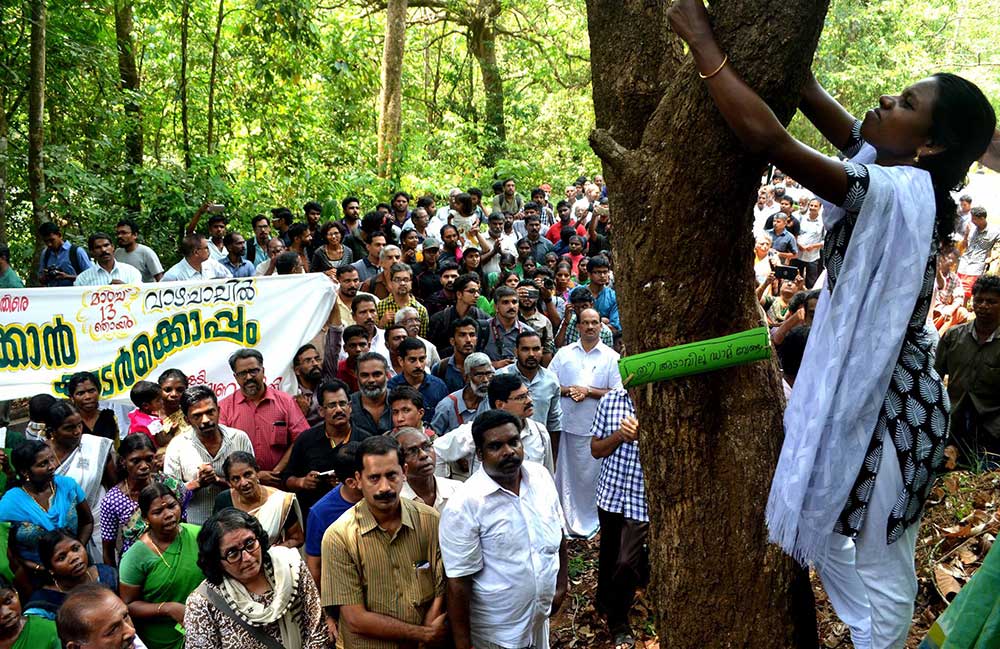
Her open letter was published in Countercurrents.org, a website based in Kerala that is dedicated to preserving the earth and all life on it by replacing the energy-intensive lifestyles of much of humanity with low-energy, sustainable economies. Giving her letter the title “Dear Sisters, They Are Killing Our Trees,” Ms. Geetha refers back to earlier fights against the dam but she quickly focuses on the threat to the trees in the area to be submerged. The government of the state of Kerala has asked the Forest Department to begin marking and assessing the trees for cutting.
She writes that the Kadar in all nine settlements in the Vazhachal Athirapilly Forest Division understand that the trees are part of a larger rainforest ecosystem. She writes effectively about their deep understanding of the value of the trees in a forest: “We value them for the coolness we feel as we walk for hours in search of food, fuel and fodder. We know and sense trees through their continuous life process by which water is rejuvenated in the ground and flows out as streams and rivers.” This is clearly a person who was raised in a forest.
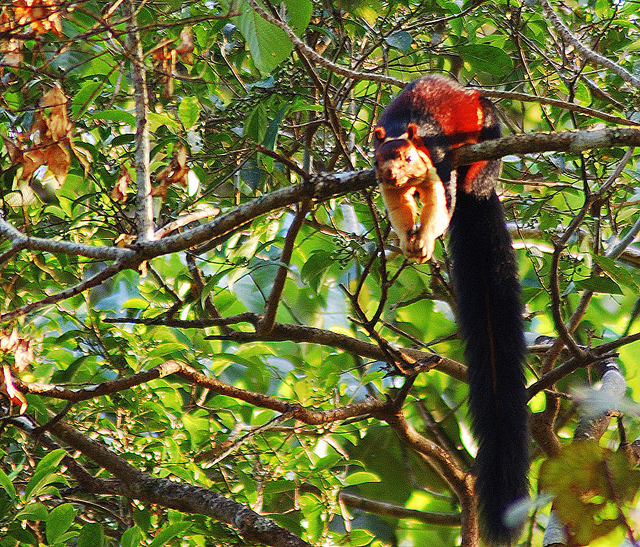
Ms. Geetha says that many creatures other than humans also depend on healthy forests, such as Malabar giant squirrels, liontailed monkeys, and other mammals. She appreciates every drop of water in the forest, which flows down the river to nourish communities below.
In the forest, she senses “the strength and generosity of trees in the honey filled flowers and the honey combs that bees make that earn us our livelihood.” The Kadar, in her view, appreciate the fish, the forest floor humus derived from leaves, and the other lifeforms in the woods. Ms. Geetha expresses Kadar appreciation for the food and fuel they take from the land.
But her expression of appreciation is subtle. She understands that dying and dead trees are necessary for some of the life forms in the forest, such as the hornbills and woodpeckers, which use them for their nests. She realizes that the root systems of trees hold the thin forest soils from eroding away. She appreciates being able to dig up roots and tubers from the forest floor.
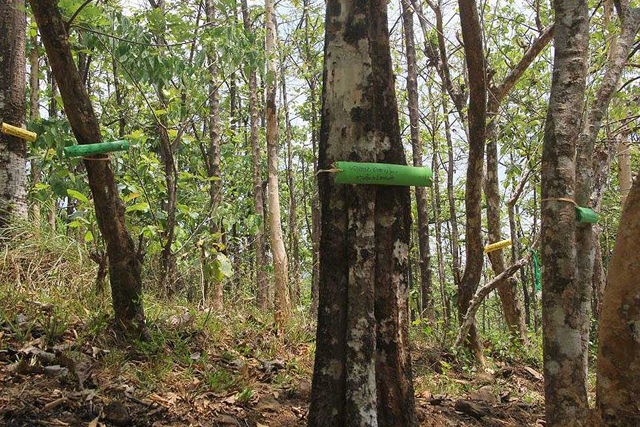
She makes it clear that the reason she and hundreds of other supporters of the Kerala forest got together on March 13 was to preserve life along the river and in the riverine forest ecosystem. As part of their celebration of the forest that day, the participants tied what she called “bamboo friendship bands” around 150 of the trees.
Kadar young people and children have been preparing for the event for weeks by painting the bands and writing messages on them. With this form of peaceful protest, the Kadar and their supporters “are declaring to the world the inalienable right we have over the forests, the trees, rivers and animals that we share our home with.” They also wanted to proclaim, through this protest, that they are indignant at not having been consulted by the government when it formulated plans for the dam—and the destruction of the forest.
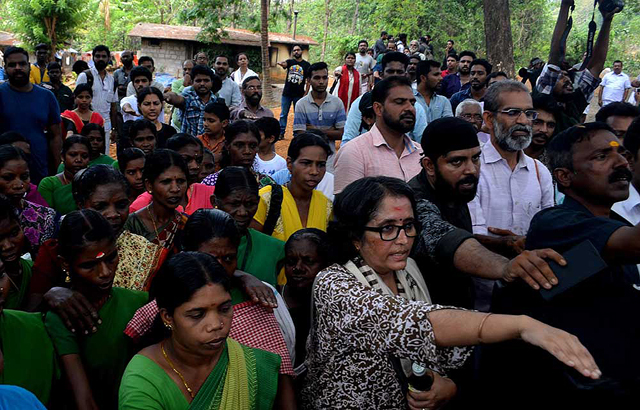
The protesters took what Ms. Geetha calls a “moving pledge” to preserve the forest from destruction. The Kadar want to go on living in the forest which gives them life next to the Chalakkudy River. She invites supporters to come to their area of Kerala, not just as casual tourists but as fellow human beings “concerned about pure water, air, soil and [the] right to life.”
Ms. Geetha has been a leader of the Kadar protests against the proposed dam for years. Her letter last week has a link back to a similar open letter she posted on July 20, 2015, also on Countercurrents.org. In both letters, she makes it clear that she is the head woman of the Kadar in the settlement most closely affected by the dam. Last year she made similar arguments that she made last week: for instance, “for us the [Chalakkudy] River is Life in all senses of the word—it is not just a few megawatts of electricity.”
An important point she made near the end of her letter of July 20 was the email address of the chairman of an Expert Appraisal Committee for River Valley and Hydroelectric Projects. While that review process may be over by now, she also provided at the end of that letter the email address of a critical member of the group opposing the dam, Ms. Latha Anantha.
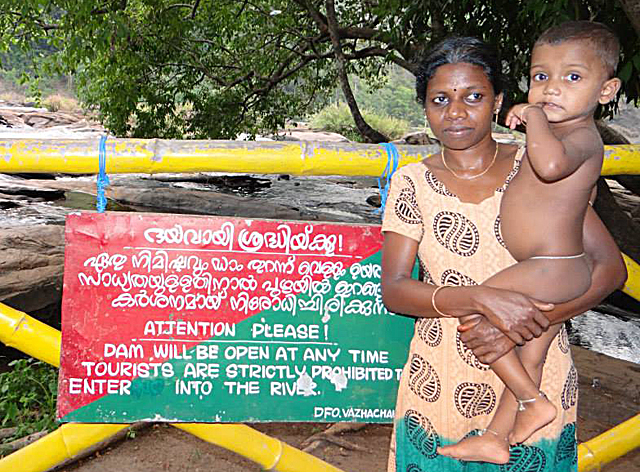
A history of opposition to the dam and the group of women leaders, including Ms. Anantha and Ms. Geetha, appeared on December 1, 2014, in a blog post on the website of the South Asia Network on Dams, Rivers and People (SANDRP). (The blog post spelled Ms. Geetha’s name “Geeta.”)
Other news stories covering the controversy about the dam have also provided information about Ms. Geetha. For instance, one in 2011 indicated that she testified at a hearing and said that the proposed dam site is about 400 meters from the two Kadar settlements. If it were to be built, more than 90 Kadar families would be forced to resettle out of their forest homes. She concluded, for the benefit of the committee members, “our livelihood is solely dependent on the forest and the river.”